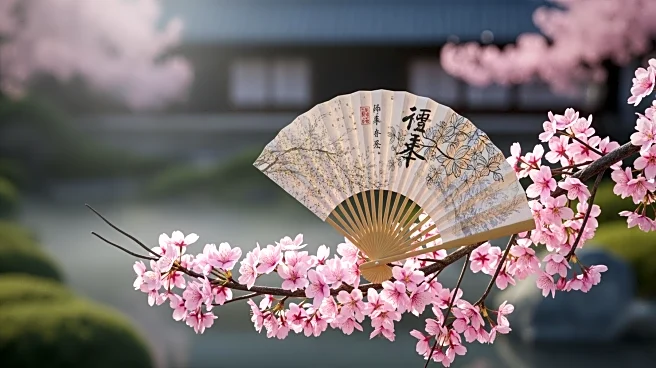What's Happening?
Japan's parliament has elected Sanae Takaichi as the country's first female prime minister. Takaichi, a 64-year-old veteran lawmaker, previously served as an economic security minister and has a unique
background as a former heavy metal band drummer. Her election comes at a time when Japan's political landscape is shifting, with the Liberal Democratic Party (LDP) facing voter dissatisfaction due to corruption and inflation issues. The LDP has lost two consecutive national elections and its long-standing coalition partner has departed, prompting the party to form a new alliance with the Japan Innovation Party (JIP). This partnership is seen as a strategic move to secure enough votes in parliament, despite the JIP's critical stance towards the LDP.
Why It's Important?
The election of Japan's first female prime minister is a significant milestone, yet it does not necessarily signal broader advancements for women's rights in Japan. Takaichi's appointment of only two women to her Cabinet highlights the ongoing gender inequality in Japanese politics, where the country ranks poorly among wealthy democracies. Her conservative views, including opposition to same-sex marriage and support for traditional gender roles, suggest limited progress in gender empowerment. Additionally, Takaichi faces challenges from populist movements critical of the LDP's handling of issues like Japan's aging population and stagnant economy. Her leadership will be crucial in navigating these domestic pressures while maintaining strong security ties with the U.S., especially with an upcoming visit from President Trump.
What's Next?
Takaichi's immediate challenge will be managing the new coalition with the JIP, which has criticized the LDP's political establishment. She will need to address populist sentiments and propose effective solutions to Japan's socio-economic issues. Her ability to maintain the coalition's stability will be pivotal for her political survival. Furthermore, Takaichi's upcoming meeting with President Trump will test her diplomatic skills, as she seeks to strengthen defense ties with the U.S. despite Japan's financial constraints. Her approach to these issues will shape Japan's domestic and international policies in the near future.
Beyond the Headlines
Takaichi's leadership could influence Japan's cultural and political landscape, particularly in terms of gender roles and conservative values. Her stance on traditional gender roles and opposition to progressive policies may reinforce existing societal norms, impacting Japan's long-term efforts towards gender equality. Additionally, her political strategies in dealing with populism and coalition dynamics could set precedents for future governance models in Japan.









